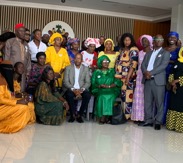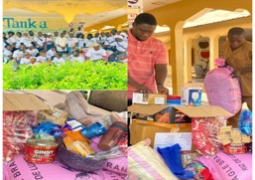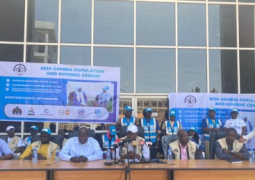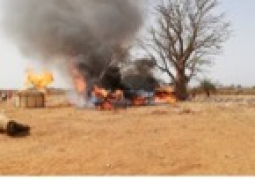
This event was aimed at equipping women with the essential skills needed to take on decision-making roles within political structures at both national and regional levels. It also seeks to provide training to IPC members and its women and youth branches on legal frameworks for women's empowerment, fundraising for political campaigns, and enhancing leadership skills.
The opening ceremony attracted government officials and representatives from multilateral organisations, marking a significant step towards empowering women in politics.
At the event, Saikou Bah, co-Chair of the Inter-Party Committee (IPC) of The Gambia, highlighted the committee's success in uniting all registered political parties to foster cooperation and promote dialogue and consensus-building in the country's political discourse.
He acknowledged the valuable partnerships with the UNDP, ECOWAS, the EU, NDI, WANEP, and others since 2017, which he said, have been instrumental in achieving peaceful coexistence and social cohesion before, during, and after elections.
“The fully funded UNDP event aims to provide the IPC's national, women, and youth branches with essential skills to enhance their participation in political leadership and decision-making processes. This initiative aligns with the Gambian government's policy of empowering women, youth, and individuals with disabilities to participate without barriers in the country's development trajectory.” Bah said.
Mary K. Badjie, co-Chair of the Youth Wing IPC, revealed that while The Gambia and the global community have made significant strides in empowering youth and women in politics, much work still remains to be done.
She outlined the instrumental role of initiatives led by the United Nations Development Program and the Inter-Party Committee in creating platforms for young voices.
Badjie thus called for more policies that actively promote youth and female participation in politics, while further advocating for the creation of mentorship programs, educational opportunities, and the accessibility and inclusivity of political processes.
She called on political parties to be committed to nominating young candidates and supporting them throughout their campaigns.
“Moreover, addressing the socio-economic barriers that prevent many young people, particularly young women, from entering politics are crucial for achieving true empowerment.”
Musu Drammeh, co-Chair of the Inter-Party Committee Women's Wing, observed the increased accessibility of education for women in The Gambia since 2016.
“According to the World Bank's Gender Data for 2022, 85.6 percent of girls completed Lower Basic School compared to 45.6 percent of boys who completed the Basic Education Cycle, indicating a closing gender gap.”
She revealed that under the Barrow Government, there has been a significant increase in higher education scholarships for girls in STEM courses, with ongoing efforts to mobilise more educational funding for those passionate about the Arts and Humanities, recognising the need for diverse disciplines in societal progress.
“Additionally, women are increasingly entering traditionally male-dominated fields through Technical and Vocational Education and Training (TVET).”
Drammeh also noted the impressive data published by various development partners, including the UN System, the African Development Bank, and the Islamic Development Bank, which underscores the positive impact of political will on the advancement of Gambian women.
Read Other Articles In National News
Bridging Gaps Advisory holds 4th Women's Leadership Forum 2021
Mar 4, 2021, 1:01 PM




